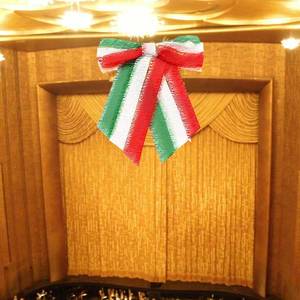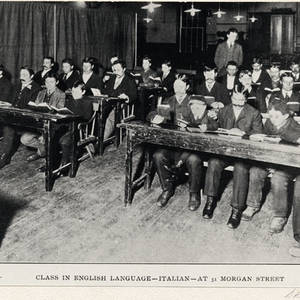A surprising new feature is offered by the the Met at the end of September. The “debut” of Italian subtitles will be held at the performance of the “ L'Elisir d'Amore” by G.Donizetti. The initiative is promoted by the Consulate General of Italy in New York
You chose: italian language
-
-
Italy's Ambassador to Washington Giulio Terzi di Sant’Agata, writes about the initiatives to promote Italian language and culture in the U.S. and the opportunities they open to the Italian-American community (Editrial note: ten days after this article was published, Ambassador Terzi was made Italy's Minister of Foreign Affairs)
-
Presenting two initiatives entirely for students and teachers: the new website of the Osservatorio sulla Lingua Italiana, US Speaks Italian is aimed, within the AP program, at helping students, parents and teachers interact and be informed, while the new interactive portal Italy4Kids, was created to provide young Americans, ages 5 to 18, with information on our country
-
i-Italy interviews Calandra Institute’s Dean Anthony Julian Tamburri about the new website www.USspeaksitalian.org.
-
Speech at the AP Annual Conference (San Francisco – 22 July, 2011). "More Italian in the USA" is the Italian Embassy’s and the Consulates’ motto. While celebrating Italy’s 150th Anniversary this year, we should not forget that the Italian language had a crucial role, it was a binding element in the building of our Country: Italian language was truly the “founding moment of national identity”, and “one of the most ancient and noble cultural forces that have united the country and kept our citizens together and cohesive abroad”, as President Giorgio Napolitano recently said.
-
2010 proved to be an intriguing year with regard to language studies. We saw some programs hit hard, others were actually saved (or so it seems), and others still were re-launched. In the end, with regard to Italian, we saw the Advanced Placement program in Italian re-launched, thanks to the efforts of so many within the Italian (read, also Italian/American) community here in the United States. One sentiment, however, seemed to raise its pesky head: namely, that we do not need to understand other languages than our own because, after all, we can read things in translation. One of these pieces was penned by John McWhorter and appeared in his The New Republic blog. I had sent a response to TNR, but they were “not interested” in it. Thus, after some musings and chats with friends and colleagues, I thought I would share it here with our readers of i-Italy.
-
High school students will once again be able to enroll in the Italian AP exam. It is a great opportunity for all students of Italian, who will be able to better face undergraduate studies.
-
It surely seems that the termination and/or reduction of Italian studies programs is becoming a habitual thing. Even if not, what can we do about it?
-
Over the past forty years, from high-school teaching to the university, and into the community, working within Italian Studies has had it challenges, to be sure. In spite of the grandeurs of Italian culture over the past 800-plus years, it seems that we often find ourselves in an up-hill battle.
-
In a recent i-Italy article, “Fighting the Good Fight”, Italophile lamenting about AP Italian continues. But, for Philo-Italian Americana, the “Better Fight” would be over the non-existence of Italian American history and culture in our public schools, colleges and universities.






































